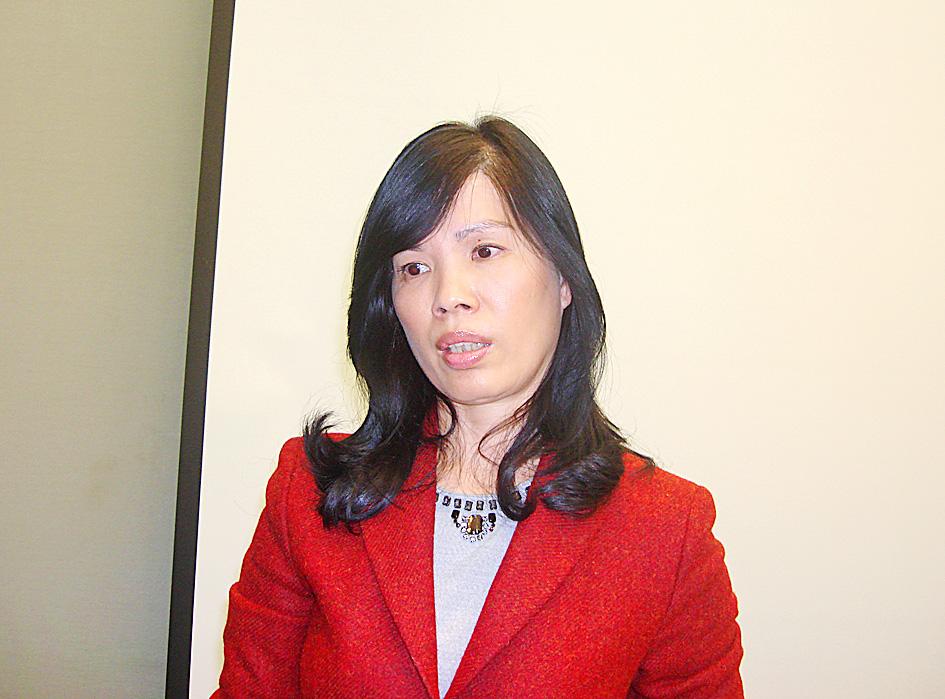Coretronic Corp (中強光電), a manufacturer of LCD backlight modules, yesterday said it plans to boost capital expenditure this year by 10 percent to cope with growing customer demand for TVs.
Coretronic plans to spend NT$1.27 billion (US$44.82 million) to buy new manufacturing equipment, as well as expand its cleanrooms in China and Vietnam, as it expects TV backlight module shipments to grow more than 50 percent this year.
The company, which counts Samsung Electronics Co and Sony Corp as its major clients, said its Vietnamese plant began operation last month and would be running at full capacity later this year.

Photo: CNA
COVID-19 lockdowns delayed the opening of the new plant, it added.
“We expect to see high volume [demand] for TV [backlight modules] this year. Based on the orders we have received from a major customer, the volume has more than doubled [from last year],” Sarah Lin (林惠姿), president of the company’s energy-saving product division, told a virtual investor conference yesterday.
Along with strong demand for notebook computers, Lin expects shipments of backlight modules for TVs, computers and monitors to grow by 10 to 20 percent this year from last year’s 45.72 million units.
However, Lin said that supply constraints in key components for LCD panels and a tight shipping market would persist through the first half of this year.
On a more positive note, a labor shortage in China has been resolved, she added.
The components and shipping constraints caused shipments to decline 15 percent sequentially to 12.66 million units last quarter, Lin said, adding that shipments are forecast to be flat this quarter.
Energy-saving products contributed about half of the firm’s revenue of NT$42.44 billion last year.
Visual products — including LED lamps and projectors — are forecast to rise by 10 to 20 percent this year, Coretronic said.
Net profit last year surged 35.3 percent to NT$1.56 billion from NT$1.15 billion in 2019, which Coretronic attributed to higher foreign-
exchange gains. That translated into earnings per share of NT$3.95, up from NT$2.65 a year earlier.
Non-operating income soared to 1.15 billion last year from NT$501 million in the previous year, while operating profit dipped 42.4 percent to NT$692 million, as the pandemic slowed demand for consumer electronics.
Gross margin slid to 17.5 percent, from 18.1 percent in 2019.

COMPETITION: AMD, Intel and Qualcomm are unveiling new laptop and desktop parts in Las Vegas, arguing their technologies provide the best performance for AI workloads Advanced Micro Devices Inc (AMD), the second-biggest maker of computer processors, said its chips are to be used by Dell Technologies Inc for the first time in PCs sold to businesses. The chipmaker unveiled new processors it says would make AMD-based PCs the best at running artificial intelligence (AI) software. Dell has decided to use the chips in some of its computers aimed at business customers, AMD executives said at CES in Las Vegas on Monday. Dell’s embrace of AMD for corporate PCs — it already uses the chipmaker for consumer devices — is another blow for Intel Corp as the company

ADVANCED: Previously, Taiwanese chip companies were restricted from building overseas fabs with technology less than two generations behind domestic factories Taiwan Semiconductor Manufacturing Co (TSMC, 台積電), a major chip supplier to Nvidia Corp, would no longer be restricted from investing in next-generation 2-nanometer chip production in the US, the Ministry of Economic Affairs said yesterday. However, the ministry added that the world’s biggest contract chipmaker would not be making any reckless decisions, given the weight of its up to US$30 billion investment. To safeguard Taiwan’s chip technology advantages, the government has barred local chipmakers from making chips using more advanced technologies at their overseas factories, in China particularly. Chipmakers were previously only allowed to produce chips using less advanced technologies, specifically

MediaTek Inc (聯發科) yesterday said it is teaming up with Nvidia Corp to develop a new chip for artificial intelligence (AI) supercomputers that uses architecture licensed from Arm Holdings PLC. The new product is targeting AI researchers, data scientists and students rather than the mass PC market, the company said. The announcement comes as MediaTek makes efforts to add AI capabilities to its Dimensity chips for smartphones and tablets, Genio family for the Internet of Things devices, Pentonic series of smart TVs, Kompanio line of Arm-based Chromebooks, along with the Dimensity auto platform for vehicles. MeidaTek, the world’s largest chip designer for smartphones

TECH PULL: Electronics heavyweights also attracted strong buying ahead of the CES, analysts said. Meanwhile, Asian markets were mixed amid Trump’s incoming presidency Taiwan Semiconductor Manufacturing Co (TSMC, 台積電) shares yesterday closed at a new high in the wake of a rally among tech stocks on Wall Street on Friday, moving the TAIEX sharply higher by more than 600 points. TSMC, the most heavily weighted stock in the TAIEX, rose 4.65 percent to close at a new high of NT$1,125, boosting its market value to NT$29.17 trillion (US$888 billion) and contributing about 400 points to the TAIEX’s rise. The TAIEX ended up 639.41 points, or 2.79 percent, at 23,547.71. Turnover totaled NT$406.478 billion, Taiwan Stock Exchange data showed. The surge in TSMC follows a positive performance